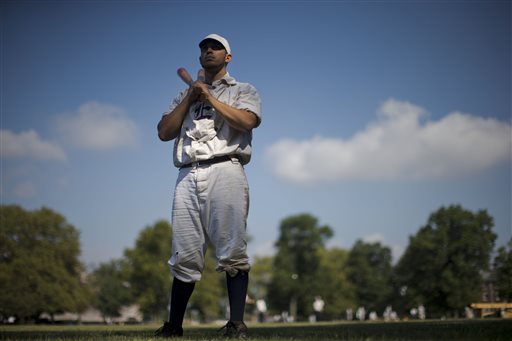PHILADELPHIA (AP) — From afar, it looks and sounds like a regular recreational baseball game: the crack of the bat, the cheering from the bench, the sliding into home.
But a closer glance at this field in Philadelphia’s Fairmount Park shows something isn’t quite right. They’re pitching underhand. No one is using a batting helmet, fielding glove or catcher’s mask. And what’s up with those floppy hats and groomed mustaches?
“Striker to the line!” bellows a man wearing a straw hat, suit and bow tie.
Translation: “Batter up!”
This is not your father’s baseball. Or even your grandfather’s baseball. It’s your great-great-grandfather’s game.
The Athletic Base Ball Club of Philadelphia plays America’s favorite pastime the old-fashioned way. It’s one of a growing number of teams nationwide that recreates the 19th century through historically accurate uniforms, period rules and cheeky nicknames. And by spelling “baseball” as two words.
“It brings people back to a simpler time, before million-dollar contracts, TVs, cars, steroids and gloves,” said Mid-Atlantic Vintage Base Ball League commissioner Bruce “Early” Leith.
Leith, who is never early, also serves as president of the Eclipse Base Ball Club of Elkton, Maryland. Eight years ago, he said, there were only three teams in that area. Today, there are 14.
“We get calls all the time from people wanting to start a club,” said Leith.
Baseball mythology has long held the game was invented in 1839 by Abner Doubleday in Cooperstown, New York. But researchers now say its regulations began to be codified in the 1840s by Alexander Cartwright and the Knickerbocker Base Ball Club of New York City.
Those bylaws were frequently revised, giving today’s vintage teams a variety of old rulebooks to choose from. The Mid-Atlantic league, which includes the Athletic and about 20 other squads from Rhode Island to Virginia, plays by what are called the 1864 rules.
One of the biggest differences between then and now is that fielders could catch a batted ball on one bounce to make an out — an understandable accommodation for players trying to handle a hard ball without gloves. Such equipment didn’t become common until later.
The Athletic club, named after the Philadelphia team founded in 1859, formed about five years ago after co-founder Scott “Big Deal” Alberts started researching the sport’s deep roots in the city. His teammates, called “ballists,” comprise a range of ages, athletic ability and occupations.
The squad sets a high standard for historical accuracy during its weekly games. Their wool uniforms, which cost about $300, include mother-of-pearl buttons, a bow tie and newsboy cap. Home plate is a white disc, the bases are sand-filled canvas bags, and the beer has been brewed from a 19th century recipe.
“We try to do everything we can as close as possible to the period,” Alberts said. “Because if we’re not doing that, we might as well just be playing softball in the park.”
Spectators Arthur and Alice Best of Lancaster, Pennsylvania, had a special appreciation for the recent Athletic game against the Delaware-based Diamond State Base Ball Club. The Bests happen to be Civil War re-enactors.
“I love that … they’re trying to be authentic by drinking out of canteens and tin cups,” said Alice Best. “And they have their bats in a barrel, or on an old wooden rack. It’s really, really nice.”
Not all teams are such sticklers for authenticity, said Dennis “Pops” Wiegmann, president of the National Vintage Base Ball Association. The organization has about 65 active clubs — some dating to the 1980s — and he estimated dozens of other teams are unaffiliated with the group.
But all share a common goal: exercise and camaraderie with a historical twist.
“It gives people another way of looking at the game,” Wiegmann said.
It gives people another way of hearing the game, too. Frequent phrases from the umpire — sometimes called the arbiter — include “Tally!” as a runner scores and “The striker is dead!” when a batter makes an out.
At which point players might let loose with a vintage curse word: “Tarnation!”
___
Online:
www.vbba.org
www.mavbbl.com
www.phillyvintagebaseball.org
___
Follow Kathy Matheson at www.twitter.com/kmatheson

COMMENTS
Please let us know if you're having issues with commenting.